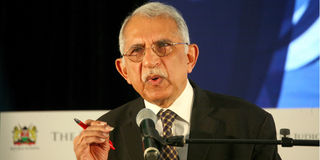
Senior Counsel Pheroze Nowrojee at a past function. He died on April 5, 2025.
Two weeks ago, the world – I mean the globe, not just Kenya – lost one of the finest human beings to ever walk our planet. Pheroze Nowrojee was born in Kenya 84 years ago when the country was a British vassal.
His professional training was in the science of law in which he rose to Senior Counsel, the highest designation for a practitioner in the craft. But Mr Nowrojee was much more than a lawyer, even though he was among the best.
Most lawyers are legal mechanics, rote actors in the theatre of the rule of law. For Mr Nowrojee, however, the law was a labour of the intellect, a seductive normative edifice, which could be used for good, or bad.
I first met Mr Nowrojee as an eager law student at the University of Nairobi in 1979. Those were heady days in Kenya. There was only one law school and it admitted less than 100 students a year.
To join law school in Kenya was a great honour and a greater responsibility to society. You were literally handed the keys to the kingdom of success.
Kenya’s leading legal giants, some of them courtroom lawyers, taught there. Among them were Mr Nowrojee himself, Prof Hastings Okoth Ogendo, Dr Willy Mutunga, iconic human rights lawyer Gibson Kamau Kuria, Prof Kivutha Kibwana, Prof Shadrack Gutto, and Dr Oki Ooko Ombaka – a constellation of stars.
In this group of remarkable men – and they were all men – Mr Nowrojee stood out. There was an unusual intensity to the man. He never took any encounter or conversation lightly, no matter who his interlocutor was.
If you were speaking with him, he focused solely on you as though you were the only thing on the planet. He searched your face with a keenness that was rare, trying to “see” you and understand you. He chose his words carefully and precisely. He spoke with great insight and empathy. These are skills that drain one’s energy, but Mr Nowrojee made it look easy. He was a busy man but when you were in front of him, he made you believe you were his only business.
Legal garb
To me, Mr Nowrojee seemed to have come from central casting. He appeared to be a man who was born in a legal garb. I couldn’t think of him as anything else but a lawyer.
As an aspiring legal thinker, I took a very keen interest in him. I took his class in Tort Law. That year, he volunteered to lead the law school’s Moot Court Competition, whose rounds are traditionally organised in elimination by sudden death. Meaning you are knocked out of the competition if you lose once. Under his tutelage, I made it to the final round with fellow student Nancy Cheluget, now Nancy Kirui, who later enjoyed stellar careers as a top civil servant and senior diplomat.
I recall the Moot Court not for reasons of vanity, but to demonstrate the man that Mr Nowrojee was. In most eulogies, society valorizes even villains. Rare is the person who speaks only the truth at a dead man’s sendoff. But with Mr Nowrojee, it’s difficult to find fault with the man, although I am sure his family knows of some, as all our families do. I have scoured his public life and found none.
But I digress. At the Moot Court, you play lawyer in a make-believe courtroom. In our case, Justice Emmanuel O’Kubasu took part during our final argument.
Mr Nowrojee prepared us meticulously and implored on us the necessity of making precise arguments.
Even for law students, seeing real-life judges is a treat. So we were awed when the good judge took the chair.
As I recall, the case concerned a rapist. It was an emotive matter. The gallery of on-lookers, made up of students, was full to the brim.
We took the floor as counsel for the rapist. I relished the moment and was raring to go. We made spirited arguments and got the gallery involved and loud. They backed our defence of the rapist.
We thought we had won hands down. But Judge O’Kubasu saw it otherwise and ruled against us. He admonished us for involving the gallery. Mr Nowrojee told us it was a good fight in spite of the outcome.
Mr Nowrojee didn’t think we should have been punished for the crowd’s involvement.
He always saw the law as a people-centred enterprise, not one to be left entirely to the whims of the men and women in strange robes. That’s how he practiced law and lived his life.
I remember his roaring argument at Kenya’s Supreme Court in the election petition pitting Azimio against Kenya Kwanza and the IEBC. His soaring rhetoric and counter argument on the doctrine of necessity was one for the ages. Let us all retrace the steps of a great man.
Makau Mutua is SUNY Distinguished Professor and Margaret W. Wong Professor at Buffalo Law School, The State University of New York. On X: @makaumutua.







